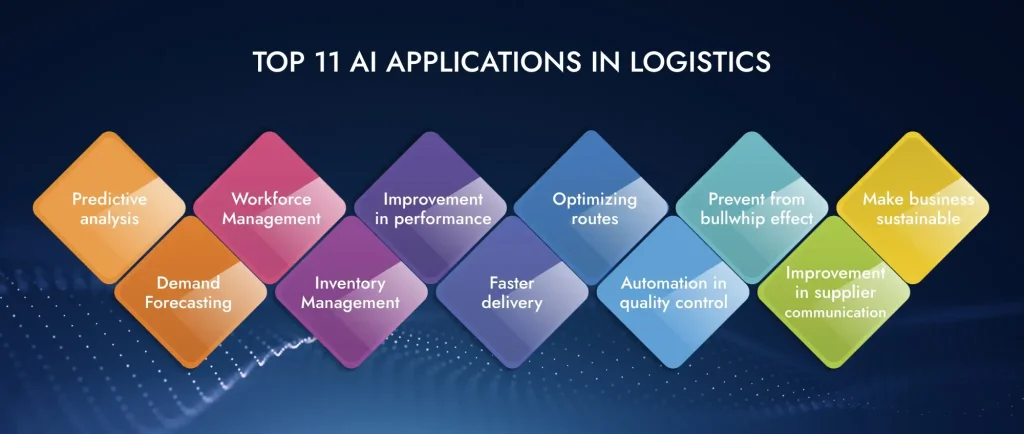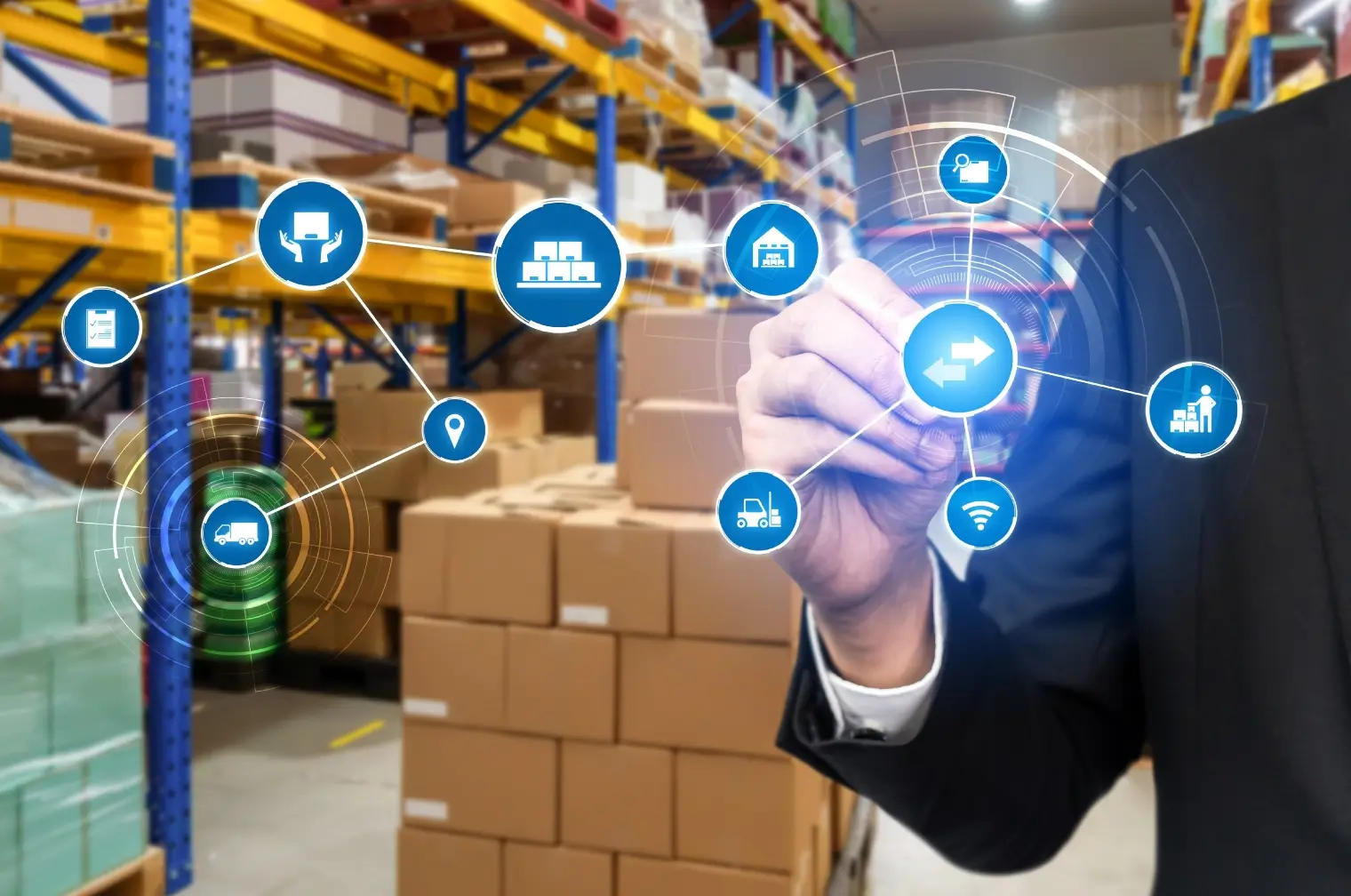Artificial intelligence has an impact on the logistics industry. It gives companies the data insights they need to make better choices and boost their productivity. AI lets businesses tackle problems before they happen taking steps to save time and money.
AI plays a part in groundbreaking changes in robotics and machine automation in logistics. Advanced AI features, like natural language processing, help with many understanding tasks. These include following verbal instructions, decoding unstructured data, and interpreting customer requests.
ViitorCloud’s AI development services can take your logistics operations to new levels of effectiveness and new ideas. We help you reach your business targets with our advanced AI solutions.
AI in logistics: Challenges and considerations
Almost everyone agrees that AI will cause a revolution in the logistics industry making it run more and boosting productivity. But the path to this change has its share of hurdles. Let’s look at some of the obstacles AI needs to clear to improve logistics processes. ViitorCloud has expertise when it comes to AI development, and we can help your company tackle these issues and get your operations running like clockwork.
The complete AI system is based on cloud technology and requires a large bandwidth for its operation. To include AI in the system, the companies have to spend a lot of money on their hardware which will significantly increase their cost of operation.
With the introduction of new technologies, every business has a clear mindset to improve the productivity of their business by absorbing maximum benefit from the new technology. As AI systems are quite complex they require proper strategy and detailed discussion, which will create problems for the companies.
The periodic maintenance of AI systems and their network management costs a good amount to the company. AI technologies require good investment in the initial stages and any component failure in the technology requires a good amount to get replaced.
Adopt the future of logistics with AI-driven solutions. Reach out to ViitorCloud to explore customized AI applications for your logistics challenges. Schedule a Consultation!
Top 11 AI applications in logistics
According to the Retail and consumer goods executives polled in 2023, artificial intelligence has the most effective implementation in the logistics industry. This data shows how effectively artificial intelligence will work in the future in the logistics industry. Now let us find out the top 11 AI applications in logistics and how AI is beneficial in logistics to make tasks easy.

1. Predictive analysis
For streamlining processes and control over inventory, demand prediction has many things to offer as it is primarily based on past data, which can be used to understand the demands. In this process, artificial intelligence can provide efficiency as it is easier to analyze data through AI. Also, with the inclusion of AI, the chances of making errors will be reduced to a significant level which will ultimately improve productivity.
The prediction of future events and strategic management of shipment is another important advantage of using AI in logistics.
2. Demand forecasting
It is quite difficult in the logistics industry to make accurate estimates of demands, and through AI, it will be easier for inventories to manage the supply of goods. Also, AI in logistics applications will assist the inventories to optimize the discounts depending on the in-stock and out-of-stock products.
In the present world, almost every old business in the industry like Logistics, is using Big Data technology to drive their business, and the use of predictive analysis with artificial intelligence is very helpful in making calculative decisions. New AI business ideas along with highly demanding products, and the use of artificial intelligence in logistics will help the companies manage the products that are out of the trend or unsold.
3. Workforce management
The complete logistics industry is dependent on their labor force as skilled labor is the need in the industry, but sometimes, the assignment of the wrong task to the wrong person results in less efficiency. To counter this issue, artificial intelligence helps in managing the workforce as this technology ensures that the tasks are assigned according to the skill of the employee. This technology allows the company to understand the training program best suited for the new hires and monitor their performance.
The appropriate assignment of tasks helps the employee to work on his strengths and the improved efficiency of the worker helps the company to become more productive. So, it proves to be a win-win situation for both the company and the worker.
4. Inventory management
With applications of AI in logistics, companies can focus on selling strategies instead of looking for inventory management manually. With artificial intelligence, the business can examine the data files that include customer behaviors and make predictions of the popular products that the company has to store in large numbers. With such predefined inventories, businesses can operate better and more optimally. According to McKinsey, the usage of artificial intelligence can reduce supply chain failures by 30% and warehouse management costs by 40%.
Many large businesses like Amazon are investing heavily in the automation of their warehouses and inventory systems. For such purposes, Amazon has taken the help of sponsorships and innovation strategies. Implementing AI in businesses aids in automating their warehouse inventory systems.
5. Improvement in performance
With a human workforce, it is not possible to analyze data every time and create relations between the unfiltered data and the future strategy. For this reason, the application of AI in the logistics industry has proven that this technology is far more efficient than we think. When it comes to building new strategies, the company has to consider many factors like weather conditions and major sites of sales.
With artificial intelligence, it becomes easier as the technology will analyze all the internal and external factors that will affect sales and make predictions according to it.
6. Faster delivery
The primary objective of every logistics company is to improve their delivery systems by ensuring faster deliveries. Artificial intelligence has improved the speed, locations, and desire of buyers to purchase the product frequently by ensuring faster deliveries. The risk of delivery failure has been reduced significantly with this technology which can’t be achieved through a human workforce.
Through the application of AI in the logistics industry, it becomes easier to predict the exact date of deliveries depending on the destination as all the processes become automated. The tracking systems become more advanced and real-time even in the case of air travel.
7. Optimizing routes
For the logistics industry, optimization of routes is one of the most effective paths as it helps in creating more optimized delivery time schedules, better fuel cost cuttings, improving driver safety measures through data, and improvement in delivery timings.
The AI-based algorithms can easily analyze traffic conditions through GPS and provide information about road closures. Also, to enhance safety, these algorithms can update the company about accidents and weather conditions of the delivery route.
8. Automation in quality control
The quality of the product is the only thing that matters for any company, and for that purpose, the company spends a significant amount on quality control teams. Through AI-based computer vision systems, the whole process of quality checks becomes automated, and these systems can work tirelessly so that they will create a big impact on the productivity of the company.
These automated systems are used by some of the big names like BMW use these automated quality check systems for scanning their finished cars in the assembly line.
9. Prevent from bullwhip effect
In the logistics industry, the bullwhip effect has a very important role in disturbing the business and making their supply chains fluctuate. This is the phenomenon that occurs when there is an issue on one side of the supply, and due to its continuity, it gets amplified to the next stages and ultimately leads to a major disturbance.
Through applications of AI in logistics, this problem can easily be tackled by the company as the technology completely operates on data. Once any problem is detected at one stage, the whole supply chain gets updated, preventing backlogs and stock problems. Current AI business trends can address various challenges through the implementation of AI in the field of logistics.
10. Improvement in supplier communication
In logistics, the communication between the company and the supplier is quite important and the AI technology offers robotic process automation that helps in automating the communications with the supplier. These communications include payment reminders and invoice sharing, as failure in these communications can cause negative impacts on the production and shipment of consignments.
11. Make business sustainable
Sustainability is the new concern of many companies as supply chain management creates indirect emissions and through AI, these operations will become more sustainable and greener. Some of the best examples of AI in logistics examples are AI-optimized vehicles used by one of the largest logistics companies DHL. They are optimizing their vehicles using AI and making them greener and more sustainable.
Ready to integrate AI into your logistics business? Partner with ViitorCloud to implement advanced AI applications and stay ahead of the competition. Get Started Now!
How does ViitorCloud help your logistic challenges with an AI solution?
The logistics and supply chain management industry poses major limitations, with big names like Echo Global Logistics, Covariant C3.ai, and Delhivery often failing to create a lasting and helpful ecosystem. These companies might be good at selling their services, but they don’t always give you the full package of solutions you’re after.
That’s why ViitorCloud’s AI solutions are different. We at ViitorCloud don’t just tackle your logistical problems; we offer continuous support and fresh ideas. Our AI-powered logistics solutions aim to boost your work and make sure you get the best outcomes in no time.
To get advanced AI technology solutions just for your logistics needs, reach out to ViitorCloud now. Our skilled AI development experts can help you hit your business targets with spot-on accuracy and support.
Frequently asked questions
AI is primarily used in the delivery of products to the customer, optimization in selecting the right carrier, and monitoring the shipment. These services help the business to improve productivity and better management of resources.
AI can be used in inventory management, optimization of routes, customer services, and forecasting demands. The inclusion of AI enables the business to be more customer-oriented and gives them the opportunity to provide more services.
AI can be used in supply chain management as it helps in the scalability of business, reduces the cost of training new hires, and manages the warehouses efficiently.

Vishal Patel
Vishal Patel is an experienced Solution Consultant with a proven track record in the information technology and services industry.
